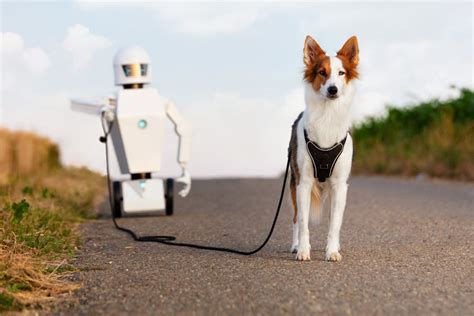Introduction
The realm of technology is witnessing an unprecedented evolution, fueled by artificial intelligence (AI). This transformative force has permeated countless industries, including the captivating domains of pet ownership and home assistance. AI robot pets and voice assistants are poised to revolutionize the way we interact with our robotic counterparts, unlocking a future of companionship and convenience.

AI Robot Pets: The Perfect Companion?
AI robot pets are designed to replicate the behavior and companionship of traditional companion animals, offering all the joy and affection without the hassle and responsibility. These sophisticated creations seamlessly integrate AI algorithms, sound systems, and motion sensors to mimic the natural movements and responses of real pets.
Global Market Outlook:
- According to Zion Market Research, the global AI robot pet market is projected to reach a staggering $5.74 billion by 2028.
- Growing adoption of AI-powered devices and increasing urbanization are driving demand for companionable robots.
Benefits of AI Robot Pets:
- Convenience: No need for feeding, grooming, or vet appointments.
- Always Available: Provide constant companionship, even when owners are away.
- Interactive Learning: Engage with owners through games and educational apps.
- Emotional Support: Offer comfort and emotional connection for those living alone or with special needs.
Voice Assistants: The All-Knowing Helper
Voice assistants have become ubiquitous in our homes, seamlessly integrating with our daily routines. These intelligent devices allow us to control smart home devices, access information, and manage schedules with just a voice command.
Global Market Outlook:
- The global voice assistant market size is estimated to reach $87.45 billion by 2025, according to Grand View Research.
- The proliferation of smart devices and the growing demand for hands-free technology are fueling market expansion.
Benefits of Voice Assistants:
- Convenience: Manage tasks efficiently without lifting a finger.
- Information Access: Provide instant access to a vast knowledge base.
- Smart Home Control: Automate home devices for added comfort and efficiency.
- Personal Assistance: Offer reminders, appointments, and other personalized support.
Comparing AI Robot Pets and Voice Assistants
Key Differences:
| Feature | AI Robot Pet | Voice Assistant |
|---|---|---|
| Primary Purpose | Companionship | Assistance |
| Interaction | Physical | Voice |
| Emotional Connection | Strong | Limited |
| Independence | Somewhat independent | Reliant on human input |
Use Cases:
- AI Robot Pets: Care for the elderly, provide therapy for children, reduce loneliness.
- Voice Assistants: Manage smart homes, play music, set reminders, assist with daily tasks.
The Best of Both Worlds: Converging Technologies
The convergence of AI robot pets and voice assistants holds immense potential for creating even more advanced robotic companions. By combining the interactive nature of robot pets with the AI capabilities of voice assistants, we can envision a future where:
- Intelligent Companions: Robots that can engage in meaningful conversations and provide emotional support.
- Personalized Assistance: Assistants that can adapt to the user’s personality and preferences, offering tailored recommendations.
- Remote Caregiving: Robots that can monitor elderly patients and alert loved ones if assistance is needed.
Future Trends and Innovations
The future of AI robot pets and voice assistants is brimming with exciting possibilities:
- Advanced AI Algorithms: Improved computational capabilities will enable robots to learn and adapt more effectively.
- Virtual and Augmented Reality Integration: Robots will interact with users in immersive virtual environments.
- New Materials and Designs: Innovations in materials will lead to more realistic and durable robot designs.
Strategies for Success
To capitalize on the burgeoning AI robot pet and voice assistant market, businesses should consider:
- Focus on Innovation: Invest in research and development to create cutting-edge products.
- Build Strong Partnerships: Collaborate with technology companies, healthcare providers, and pet care industry experts.
- Leverage AI and Data Analysis: Collect and analyze user data to improve product performance and personalize experiences.
- Target Niche Markets: Identify specific customer segments with unmet needs, such as the elderly or those with disabilities.
Tips and Tricks for Consumers
- Set Realistic Expectations: Remember that AI robot pets and voice assistants are still evolving technologies.
- Research Products Thoroughly: Read reviews, compare features, and consider the specific needs of your household.
- Explore Use Cases: Think beyond traditional applications and explore innovative ways to use these technologies.
- Stay Informed: Keep up with the latest advancements to make informed decisions about future purchases.
Market Insights
- Growing Demand for Emotional Connections: The COVID-19 pandemic has heightened the need for companionship and emotional support, making AI robot pets a viable solution.
- Aging Population: The increasing number of elderly individuals is creating a demand for robotic companions that can provide assistance and reduce loneliness.
- Advancements in AI: Rapid advancements in AI algorithms and machine learning are enabling robots to become more intelligent and interactive.
Conclusion
AI robot pets and voice assistants are transforming the way we interact with technology and experience companionship. Their convergence holds immense promise for creating a future where robots seamlessly integrate into our lives, providing comfort, convenience, and support. By embracing innovation, leveraging research, and understanding the evolving needs of consumers, businesses and individuals alike can harness the power of these technologies to unlock a world of unprecedented possibilities and companionship.





















